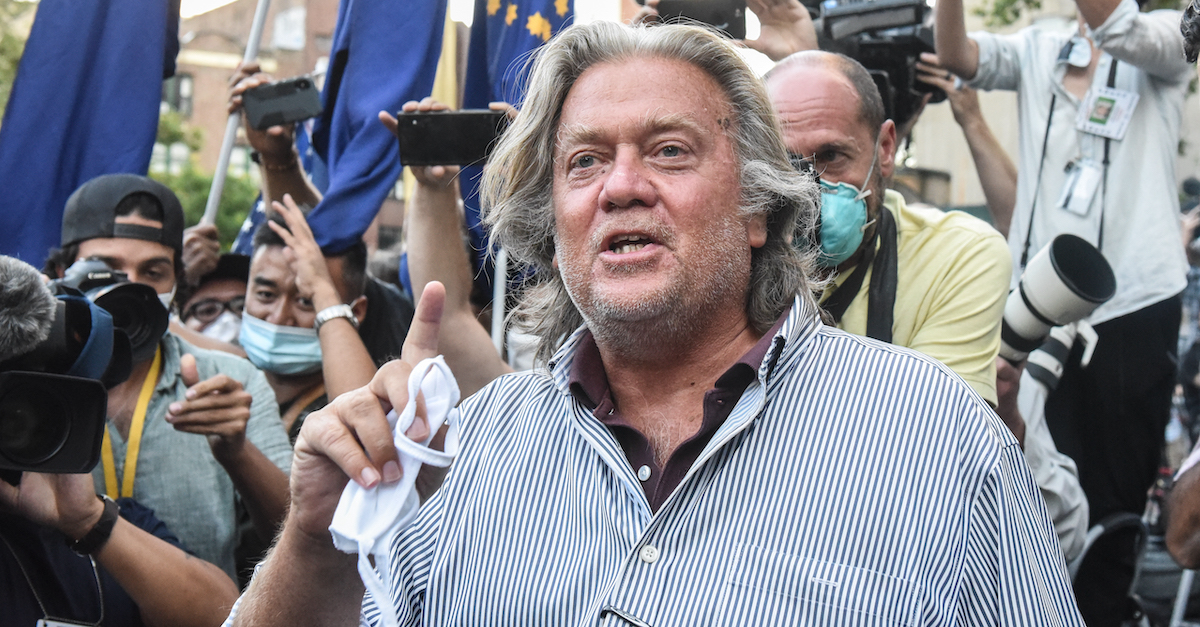
Steven Bannon, the Donald Trump strategist facing criminal charges for stonewalling the congressional inquiry into the Jan. 6 attack on the U.S. Capitol, has been ordered to stand trial in July 2022.
Bannon was indicted in November for refusing to comply with a subpoena from the House committee investigating Jan. 6. Bannon has said that he is subject to Trump’s assertion of executive privilege — an assertion itself that some judges have met with skepticism.
U.S. District Judge Carl Nichols, a Trump appointee, made the determination in a hearing Tuesday that neither side in the case would get exactly what it wanted.
“I’m loathe to suggest that I’m merely splitting the difference, that’s not what I’m doing here,” Nichols said. “I do think the defendant’s proposal for an October trial date is too slow and too long from today, but the government’s April date doesn’t reflect adequately” the amount of time Bannon’s arguments will take — “whether they have merit or not.”
Nichols then suggested a two-week trial starting in July, ultimately setting it for July 18 after Nichols and the attorneys checked their calendars.
Federal prosecutors have framed the case as relatively uncomplicated.
“In our view, this is a very straightforward case as to whether the defendant showed up,” Assistant U.S. Attorney Amanda Vaughn said at Bannon’s arraignment on Nov. 18. This sentiment was echoed in the government’s portion of a joint status report filed Monday, in which prosecutors anticipated a trial that needed just one day of testimony.
Bannon’s legal team, on the other hand, anticipated a significantly longer trial and said that the case is legally complicated.
“Although it is too early in the case to estimate with any degree of precision the length of time it will take to cross-examine Government witnesses, or the number of witnesses that would be called in the defense case, our best estimate is that a trial in the matter would take approximately 10 trial days,” lawyers for Bannon wrote in the status report.
“This case raises complex constitutional issues of first impression,” Bannon’s status report said. “Some of these issues involve inter-branch relationships and on the operations of the U.S. government at its highest levels. There is no basis for having these issues adjudicated on a rushed basis.”
At Tuesday’s hearing, Bannon attorney David Schoen said that the legal issues are “not just weighty, but fact-intensive”nand went on to describe why he anticipated a complicated discovery process in this case.
Schoen said that he believed the grand jury that issued the indictment against Bannon didn’t receive proper instructions and wasn’t given exculpatory evidence. He said that a motion to dismiss would argue, among other things, that the House committee improperly issued the subpoena, perhaps as part of a “partisan political attack” on Bannon.
“The House said in public statements they want to investigate the root causes of what happened on Jan. 6, a momentous episode in American history,” Schoen recounted. He then went on to question why certain people (including Rep. Jamie Raskin (D-Md.), who was also the House impeachment manager for Trump’s second impeachment trial following Jan. 6) were assigned to the House committee.
“We’re entitled to know what the processes were in the House committee [selection process],” Schoen said.
Schoen also said that Bannon “made the offer to go before a civil court” and would have complied with the subpoena if the civil court had ordered him to do so. “That course wasn’t taken,” Schoen said.
“When the decision was made to go criminal, it was no longer a quest for information,” Schoen added.
Nichols also heard from the lawyers on the issue of a protective order. The parties agreed that grand jury materials and documents with personally identifiable information were subject to a protective order, but they split as to how other documents should be handled. Bannon’s team argued that documents should be made public, and the government sought to limit widespread public access.
“The defendant has said he intends to ‘make this case hell’ for those involved” by widely disseminating documents and materials from the trial, Assistant U.S. Attorney Vaughn said Tuesday. Vaughn added that allowing Bannon to do that would “interfere with proper procedure in this case” and potentially influence other witnesses.
“This case should be decided in the courtroom through this litigation, not in the media,” Vaughn said.
Bannon attorney Matthew Corcoran argued that the government’s proposed protective order, which would limit Bannon’s use of discovery for trial purposes only, is a “very stringent restriction” and said that “leading members of the press” also oppose the government’s stance.
“They want a public trial, they want public access to documents, there is public interest in this case,” Corcoran said, while also denying that Bannon and his legal team want the case tried in the court of public opinion.
“That is not our intention at all,” Corcoran said. “What we do want, though, is for the public to have the ability to see how the decisions were made in this case . . . I think it’s a positive thing actually that there’s public interest in this case that has important and complex constitutional issues at play that involve the interplay between the legislative branch and the executive branch. From my perspective that is a positive thing.”
Corcoran added that a protective order would place “severe” limits on Bannon’s First and Fifth Amendment rights.
Nichols did not rule on the issue of the protective order but instead took the parties’ arguments under advisement.
Nichols also ordered the parties to meet and confer about pretrial deadlines by Dec. 16.
You can read the parties’ joint status report here:
[Image via Stephanie Keith/Getty Images.]